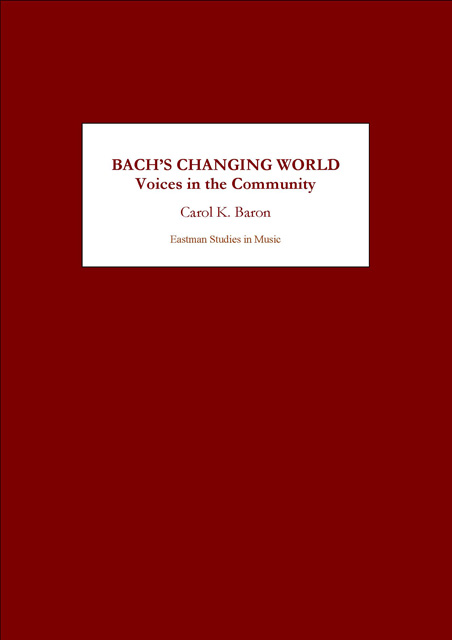Book contents
- Frontmatter
- Dedication
- Map
- Contents
- List of Illustrations
- Editor's Acknowledgments
- 1 Transitions, Transformations, Reversals: Rethinking Bach's World
- 2 Tumultuous Philosophers, Pious Rebels, Revolutionary Teachers, Pedantic Clerics, Vengeful Bureaucrats, Threatened Tyrants, Worldly Mystics: The Religious World Bach Inherited
- 3 Family Values and Dysfunctional Families: Home Life in the Moral Weeklies and Comedies of Bach's Leipzig
- 4 Bach in the Midst of Religious Transition
- 5 Bach's Situation in the Cultural Politics of Contemporary Leipzig
- 6 The Reception of the Cantata during Leipzig Church Services, 1700–1750
- 7 From Salon to Kaffeekranz: Gender Wars and the Coffee Cantata in Bach's Leipzig
- 8 A Treatise on Liturgical Text Settings (1710)
- 9 Random Thoughts About Church Music in Our Day (1721)
- Notes on the Contributors
- Index
- Eastman Studies in Music
9 - Random Thoughts About Church Music in Our Day (1721)
Published online by Cambridge University Press: 17 March 2023
- Frontmatter
- Dedication
- Map
- Contents
- List of Illustrations
- Editor's Acknowledgments
- 1 Transitions, Transformations, Reversals: Rethinking Bach's World
- 2 Tumultuous Philosophers, Pious Rebels, Revolutionary Teachers, Pedantic Clerics, Vengeful Bureaucrats, Threatened Tyrants, Worldly Mystics: The Religious World Bach Inherited
- 3 Family Values and Dysfunctional Families: Home Life in the Moral Weeklies and Comedies of Bach's Leipzig
- 4 Bach in the Midst of Religious Transition
- 5 Bach's Situation in the Cultural Politics of Contemporary Leipzig
- 6 The Reception of the Cantata during Leipzig Church Services, 1700–1750
- 7 From Salon to Kaffeekranz: Gender Wars and the Coffee Cantata in Bach's Leipzig
- 8 A Treatise on Liturgical Text Settings (1710)
- 9 Random Thoughts About Church Music in Our Day (1721)
- Notes on the Contributors
- Index
- Eastman Studies in Music
Summary
In 1722, Johann Mattheson, a prolific writer on all musical matters, as well as a prominent musician, commented with high praise on a book that had appeared the previous year.
In recent days a small German publication of five and a half sheets has come into my view which I regard more highly than many volumes with so many words. Not just because the author, Mr. Gottfried Ephraim Scheibel, mentions me in several places with perhaps undeserved praise—although I am highly indebted to him for the honor he renders me in this manner—but because I have never read anything of this sort that conforms so well with my sentiments.
In particular, Mattheson quotes Scheibel's counsel that writing poetry to be read is very different from writing texts to be sung. He agrees with Scheibel that few of their contemporaries are able to write poetry that communicates the affect to be expressed in the music. The difference between the two, Mattheson notes, is that he comments from the perspective of a composer, whereas Scheibel identified himself as a philosophe.
A few years later, after Scheibel's 1725 publication of Poetische Andachten (Poetic Meditations), Mattheson again praised Scheibel, calling him a “well-disposed theological poet.” Later in the same work he labels Scheibel a “theologian and candidate for the ministry.”
In spite of his theological concerns, however, Scheibel did not enter the ministry but spent his career as a teacher at the Elizabeth Gymnasium in his home town of Breslau. His wide interests are revealed in the range of topics treated in his publications. In addition to the treatise on church music presented here, Scheibel also wrote a short history of church music, Die Geschichte der Kirchen- Music alter und neuer Zeiten. His concern for good poetry is evident in his writings on church music, and, similarly, his concern for good church music is expressed in his writings on poetry. His Die unerkannte Sünden der Poeten (The Unrecognized Sins of Poets), published in Leipzig in 1734, takes aim at both the poetry and the lifestyles of many poets of his day but at the same time lauds those civic societies of poets, such as the Hamburg Patrioten-Gesellschaft, that upheld the moral value of poetry. Scheibel credited Mattheson with making him aware of the members of this organization.
- Type
- Chapter
- Information
- Bach's Changing WorldVoices in the Community, pp. 227 - 250Publisher: Boydell & BrewerPrint publication year: 2006
- 1
- Cited by



